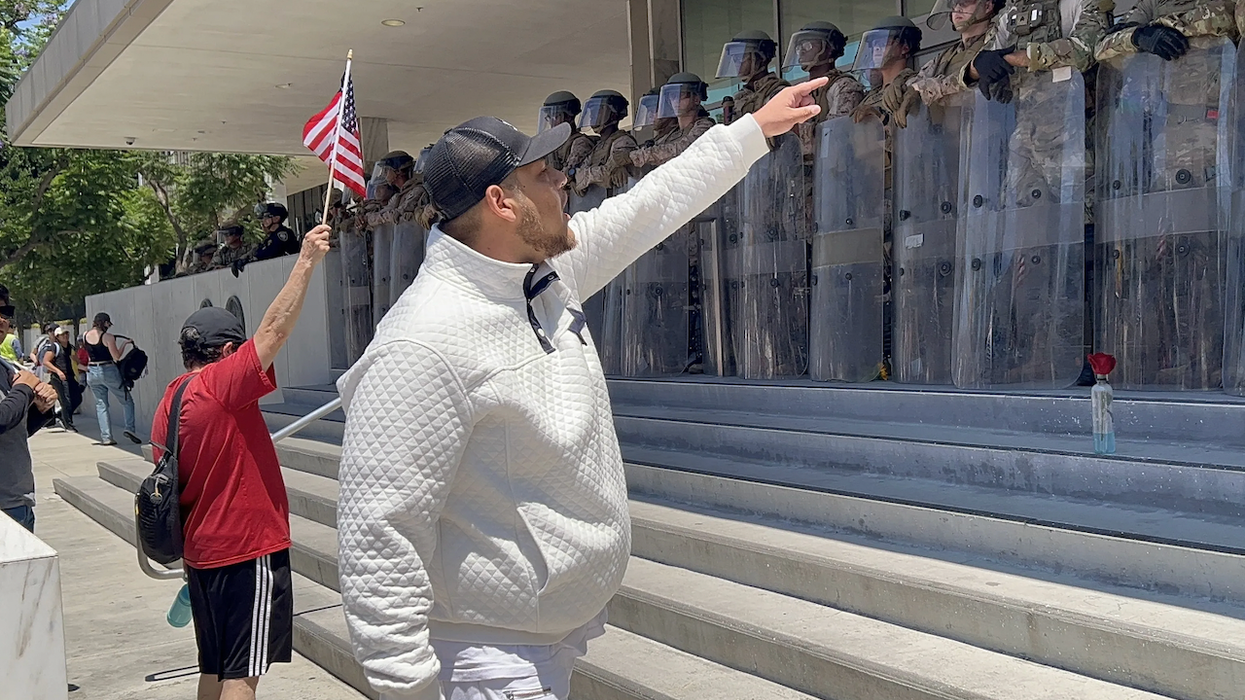
© 2025 Blaze Media LLC. All rights reserved.
Here's Everything You Need to Know About the NSA Spy Program Hearings on Capitol Hill Tuesday
June 18, 2013
What should Edward Snowden expect from U.S. governmen? "Justice."
Army Gen. Keith Alexander, director of the NSA, and FBI Deputy Director Sean Joyce, spent nearly three hours today answering questions from members of the House Intelligence Committee regarding the two recently disclosed programs said to collect U.S. phone records and tracking the use of U.S. Internet servers by potential, foreign terrorists.
 Sean Joyce (R), deputy director of the Federal Bureau of Investigation testifies before the House Select Intelligence Committee along side (L-R) Chris Inglis, Deputy Director of the NSA; and General Keith Alexander, director of the National Security Agency on June 18, 2013 in Washington, DC. The committee heard testimony on the topic of "how the disclosed NSA programs protect Americans from terror attacks on US soil, and why the disclosure of that classified information aids our adversaries." (Photo: Win McNamee/Getty Images)
Sean Joyce (R), deputy director of the Federal Bureau of Investigation testifies before the House Select Intelligence Committee along side (L-R) Chris Inglis, Deputy Director of the NSA; and General Keith Alexander, director of the National Security Agency on June 18, 2013 in Washington, DC. The committee heard testimony on the topic of "how the disclosed NSA programs protect Americans from terror attacks on US soil, and why the disclosure of that classified information aids our adversaries." (Photo: Win McNamee/Getty Images)
The intelligence officials defended the programs as being critical to thwarting terrorist threats and even provided a few examples of how it has been successful at doing so.
Here are a few details that came out of the questioning:
- Alexander said 50 potential terrorist attacks were foiled due to information that came from intelligence gathering programs. Ten of these plots had connections in the United States. Four examples of disrupted plots were given:
- NYC subway: The plan of would-be subway bomber, Najibullah Zazi, and two others were foiled through email and phone records. Zazi was arrested in 2009.
- NYSE: Joyce said the NSA was able to identify an extremist in Yemen who was in touch with Khalid Ouazzani in Kansas City, Mo. They were able to identify co-conspirators and thwart a plot to bomb the New York Stock Exchange.
- Mumbai and Jyllands Posten: David Headley, an American, was arrested in 2008 for helping plan the attack that killed 35 in India. He was involved in planning an attack against Jyllands Posten newspaper in Denmark, which had run a cartoon about Muhammad, but this attack was said to be foiled by the NSA's surveillance.
- Somalia terror financing: A terrorist financier inside the U.S. (San Diego) was identified and arrested in October 2007, thanks to a phone record provided by the NSA. The individual was making phone calls to a known designated terrorist group overseas. Rep. Mac Thornberry, R-Texas, asked if that country was Somalia, which Joyce confirmed, though he said U.S. counterterrorist activities in that country are classified.
- The NSA's Internet program helped stop 90 percent of the 50 plots, according to Alexander.
- Unless an individual investigation is underway, the NSA does not conduct "pattern analysis," where data would be under constant review in an effort to see patterns in real-time. Alexander said: "We are not authorized to go into the data. There are no automated processes running in the background."
- Is there a database of video, audio and emails of Americans? NSA, FBI and DOJ said no. If phone calls or emails of citizens are to be targeted, it is not done without a court order first, according to Alexander.
- The director of national intelligence's legal chief, Robert Litt, said that if the NSA finds it has accidentally gathered a phone call by a target who had traveled into the U.S. without their knowledge, they have to "purge" that from their system. The same goes for an accidental collection of any conversation because of an error. Information related to an American who is found not to be relevant to a counterterrorism investigation must be destroyed, he added
- The former government contractor who started the leaks of these classified programs, Edward Snowden, is currently hiding out in Hong Kong. What is expected for him? "Justice," Joyce said.
- Alexander said Snowden's leaks have caused "irreversible and significant damage to this nation."
- All NSA agents are trained in how to protect citizens' data. Alexander said Snowden had access to internal documents that were meant to give better insight into how the NSA works, but that he didn't know the "training and certification process that our folks go through."
Watch CBS' report for more of a recap:
The Associated Press contributed to this report.
--
[related]
Want to leave a tip?
We answer to you. Help keep our content free of advertisers and big tech censorship by leaving a tip today.
Want to join the conversation?
Already a subscriber?
more stories
Sign up for the Blaze newsletter
By signing up, you agree to our Privacy Policy and Terms of Use, and agree to receive content that may sometimes include advertisements. You may opt out at any time.
Related Content
© 2025 Blaze Media LLC. All rights reserved.
Get the stories that matter most delivered directly to your inbox.
By signing up, you agree to our Privacy Policy and Terms of Use, and agree to receive content that may sometimes include advertisements. You may opt out at any time.





